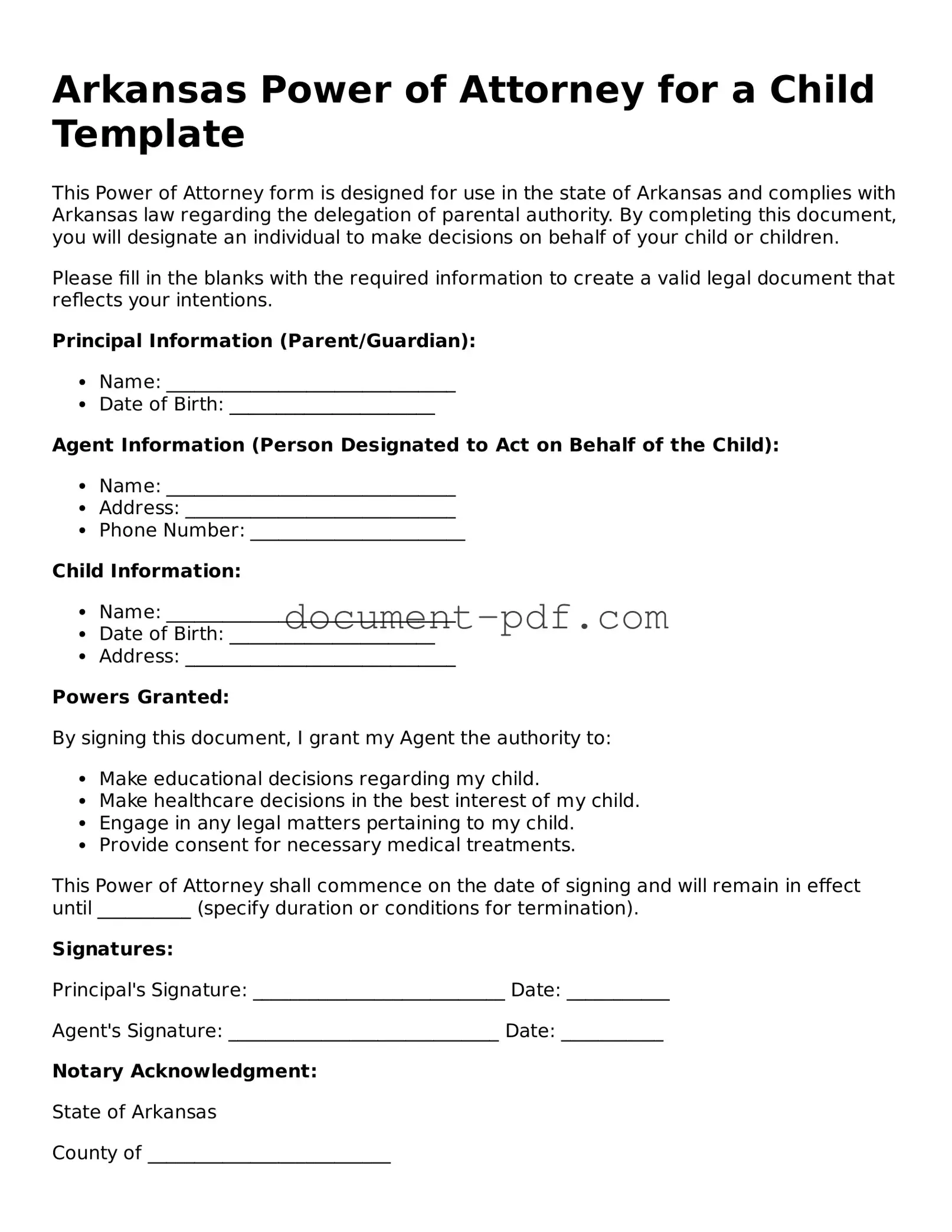The Arkansas Power of Attorney for a Child form is similar to the General Power of Attorney. Both documents grant authority to an agent to make decisions on behalf of another person. However, while the General Power of Attorney can cover a wide range of financial and legal matters, the Power of Attorney for a Child specifically focuses on decisions related to the care and welfare of a minor child. This includes medical decisions, educational choices, and day-to-day care, ensuring that the child’s needs are prioritized.
Another related document is the Medical Power of Attorney. This form allows an individual to designate someone to make healthcare decisions on their behalf if they become unable to do so. Similar to the Power of Attorney for a Child, it focuses on medical issues, but it is intended for adults rather than minors. Both forms empower a trusted person to act in the best interest of another, but the Medical Power of Attorney is specifically tailored for health-related decisions.
The Guardianship Agreement also shares similarities with the Power of Attorney for a Child. A guardianship involves a court-appointed individual who has legal authority over a minor. While the Power of Attorney allows a parent to delegate authority temporarily without court involvement, guardianship is a more permanent solution. Both documents aim to ensure the child’s welfare, but guardianship provides a higher level of legal oversight.
The Child Custody Agreement is another document that resembles the Power of Attorney for a Child. Both deal with the care and upbringing of a child, but custody agreements are typically established during divorce or separation proceedings. These agreements outline where the child will live and who will make decisions about their upbringing. The Power of Attorney for a Child can complement custody arrangements by allowing a parent to delegate authority during specific situations.
The Adoption Agreement also relates to the Power of Attorney for a Child. Both documents focus on the welfare of a child, but adoption is a legal process that permanently transfers parental rights to another individual or couple. In contrast, the Power of Attorney for a Child is a temporary arrangement that allows a designated person to make decisions without altering legal parental rights. Both aim to provide care and support for the child.
The Temporary Custody Agreement can be compared to the Power of Attorney for a Child as well. This document is often used when parents need to arrange for the temporary care of their child, such as during a short-term absence. While the Power of Attorney grants authority to make decisions, a Temporary Custody Agreement typically outlines living arrangements and responsibilities during a specific timeframe, ensuring the child’s needs are met in the interim.
For those navigating estate planning in Texas, understanding the functions of various legal documents can be crucial to ensuring that your intentions are honored. The Texas Transfer-on-Death Deed form provides a straightforward method for homeowners to pass on their property to a beneficiary without the complexities of probate. To facilitate this process, it’s essential to download and submit the form correctly, ensuring that your wishes are clearly communicated and legally binding.
The Consent to Medical Treatment form is another document that shares similarities. This form allows a parent or guardian to give permission for medical treatment for a child. Like the Power of Attorney for a Child, it is focused on the child’s welfare. However, the Consent to Medical Treatment form is more specific, dealing solely with healthcare decisions, whereas the Power of Attorney encompasses a broader range of responsibilities.
The Educational Power of Attorney is also akin to the Power of Attorney for a Child. This document allows a parent to delegate authority to another individual to make educational decisions on behalf of their child. Similar to the Power of Attorney for a Child, it ensures that someone trusted can act in the child’s best interest regarding schooling and educational matters, but it is specifically limited to that area.
Lastly, the Special Needs Trust can be considered similar in its focus on the welfare of a child, particularly those with disabilities. This legal arrangement allows for the management of assets for a child with special needs without jeopardizing their eligibility for government benefits. While the Power of Attorney for a Child addresses immediate decision-making authority, a Special Needs Trust is designed for long-term financial planning and care, ensuring that the child's future needs are met.

